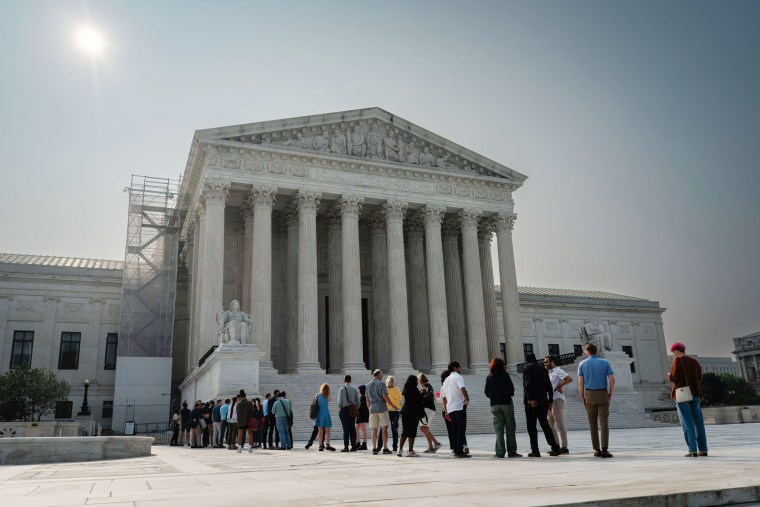WASHINGTON — Justice Elena Kagan drew laughter in February when she remarked in court that she and her eight colleagues on the Supreme Court are not "the nine greatest experts on the internet."
But that hasn't stopped the justices from taking up a new series of high-stakes cases on the role of social media in society, all of which raise different free speech questions and could have broad repercussions.
The cases on the docket reflect how social media has become a contentious battleground in society as a whole, with the rules of the road yet to be fully defined.
“Collectively, they are likely to have quite dramatic effect on the digital public sphere,” said Jameel Jaffer, executive director of the Knight First Amendment Institute at Columbia University.
Noting that the Supreme Court gets to decide what cases it takes up, he added that the justices “plainly want to be part of this debate.”
The court hears the first round of arguments in those cases on Tuesday, as the justices weigh a recurring question that first came to prominence when then-President Donald Trump blocked critics from following him on Twitter: When a public official blocks someone does that violate the Constitution’s First Amendment?
The cases feature public officials with significantly lower profiles than Trump: members of a school district board of trustees in Southern California and a city manager in Michigan.
The ways the issue has arisen at all levels of government reflects how elected officials increasingly use social media to interact with voters.
The Supreme Court’s ruling on whether the officials were acting in their official capacities when posting to social media, meaning they can be sued for violating free speech rights under the Constitution's First Amendment, will have a broad impact in guiding how lower courts handle such cases.
Later in the court's term, which runs until June, the justices will hear oral arguments over the constitutionality of Republican-backed laws in Florida and Texas that seek to prevent social media companies from banning users for contentious rhetoric. Both laws were enacted at a time when Republicans were outraged at what they perceived as anti-conservative bias in moderation decisions.
In those cases it is the social media companies themselves, via trade groups, arguing that their free speech rights to choose what content to allow on their platforms would be violated.
Finally, the court will consider claims that the Biden administration has unlawfully put pressure on social media platforms to remove content with which it disagrees, a form of coercion dubbed "jawboning" — on issues such as criticism of the government response to the pandemic.
Again, the case raises free speech claims, on this occasion brought by states and individuals asserting the First Amendment right of users to be able to post their chosen content without government interference.
Earlier this year the court heard two other cases concerning Twitter and Google. Then, the court sidestepped a major ruling that could have limited the liability protections that platforms enjoy for content posted by users.
Daphne Keller, an expert on internet law at Stanford Law School, said the justices in those earlier cases, as shown by Kagan's quip made at oral argument, realized they had taken up an issue that was "frankly too complicated for their first foray into this area."
As such, the justices "recognized what huge unintended consequences a careless ruling could have," she added.
The Supreme Court itself, unlike some high courts in other countries, has no social media presence and none of the justices have accounts in their professional capacities. In 2020, Kagan admitted to being an anonymous lurker on Twitter, while former Justice Stephen Breyer said more than a decade ago that he was a Twitter and Facebook user.
The average age of the justices has, however, decreased substantially in the last six years, with four new justices all now in their 50s replacing much older members of the court.
But lawyers point out that the new cases are squarely on an issue the justices do know about — free speech rights — and do not hinge on a deep understanding of technology.
"Many of these cases talk about how social media is the modern public square to try to convey to the justices, who may not be as familiar with social media, just how important this is in the present day and age," said Jenin Younes, a lawyer at the New Civil Liberties Alliance who represents individual plaintiffs in the jawboning case.
"I do think it can be hard for some people who don't use it as much to grasp that this is where a lot of public discourse takes place," she added.
Ironically, the cases reach the Supreme Court as some industry experts have started to predict that the age of social media may already be over.
Anger on the right aimed at social media companies has also been blunted somewhat by Elon Musk's takeover of Twitter, which he has renamed X.
Conservative outrage that led to the Florida and Texas laws being enacted in 2021 was fueled in part by the decisions of Twitter, Facebook and others to ban Trump after his effort to overturn the 2020 presidential election results ended in his supporters storming the U.S. Capitol on Jan. 6, 2021.
In contrast with the previous Twitter management, Musk has allied himself with conservative critics of the platform and allowed various banned users, including Trump, to return, while abandoning efforts to limit the spread of disinformation.
Jaffer stressed the importance of the justices cutting through the politics of the day and coming up with legal rules that will apply fairly no matter who is in power.
“It’s not that easy to come up with the right answers even for those thinking about it every day,” he said. “These are hard questions.”

